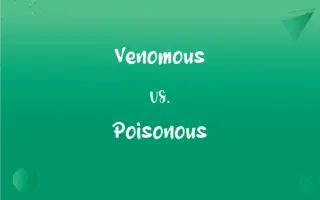Forecasting vs. Prediction: What's the Difference?
Edited by Janet White || By Harlon Moss || Published on November 12, 2023
Forecasting involves systematic, data-driven estimation of future events, often in a specific field; prediction is a broader term for any statement about the future.

Key Differences
Forecasting often relies on historical data and analytical techniques. It's commonly used in fields like meteorology, economics, and supply chain management. Prediction, however, can be based on less structured information and intuition. It encompasses a wider range of contexts, including everyday guesses.
The process of forecasting typically involves statistical models. These models are refined over time to improve accuracy. Predictions might not necessarily employ rigorous methodologies; they can be based on subjective judgments or assumptions.
Forecasting is generally associated with a systematic approach to predicting future events. This systematic approach often involves specific tools and software. On the other hand, predictions can be made by anyone and might not rely on any formal method or tools.
In many professional domains, such as finance or weather forecasting, the term "forecasting" implies a certain level of expertise and data analysis. Predictions, conversely, can be made in casual, non-professional contexts, like predicting the outcome of a game.
Forecasting often aims for precision and regularly updates its models based on new data. Predictions, while they can be informed by data, might not have the same emphasis on continuous refinement and precision.
ADVERTISEMENT
Comparison Chart
Basis
Often relies on systematic, data-driven methods
Can be based on intuition or informal methods
Context
Common in professional and scientific fields
Used in both casual and formal contexts
Methodology
Typically involves statistical models
May not use structured models
Level of Specificity
Usually specific and tied to certain domains
Can be more general or varied
Continuous Refinement
Involves updating models based on new data
Might not involve systematic refinement
ADVERTISEMENT
Forecasting and Prediction Definitions
Forecasting
Prediction in specific domains like weather or finance.
Weather forecasting predicts heavy rainfall tomorrow.
Prediction
A statement about what might happen in the future.
My prediction is that electric cars will dominate the market in ten years.
Forecasting
Involves systematic methods and models.
Our sales forecasting uses statistical models for accuracy.
Prediction
Can be used in casual, everyday contexts.
My prediction for tomorrow's weather is sunny, despite the forecast.
Forecasting
Often relies on historical trends and data.
Demand forecasting for the product is based on last year's sales data.
Prediction
Not necessarily tied to data or systematic analysis.
His prediction of the election outcome was just a guess.
Forecasting
Estimation of future events based on data analysis.
The economic forecasting indicates a possible recession next year.
Prediction
Can be based on intuition or informal reasoning.
I have a prediction that our team will win the championship.
Forecasting
Continuously refined with new information.
Continuous forecasting updates are crucial for accurate supply chain management.
Prediction
Less emphasis on continuous refinement.
Her prediction about the trend didn't change despite new information.
Forecasting
To estimate or predict in advance, especially to predict (weather conditions) by analysis of meteorological data.
Prediction
The act of predicting.
FAQs
Is forecasting always accurate?
No, forecasting aims for accuracy but is not always precise.
Can a forecast be a prediction?
Yes, a forecast is a type of prediction, but more data-driven.
Is forecasting only for weather?
No, it's used in various fields, including finance and logistics.
Can anyone make a forecast?
Generally, forecasting is done by experts in a specific field.
Can predictions be about the past?
Generally, no. Predictions are oriented towards future possibilities.
Can a forecast be informal?
Forecasts are usually formal and based on systematic methods.
Can a prediction be a guess?
Yes, predictions can range from educated guesses to casual assumptions.
Is a prediction the same as a hypothesis?
No, a hypothesis is a proposed explanation; a prediction is about future outcomes.
Is prediction a part of forecasting?
Yes, forecasting includes making predictions but in a structured way.
Do predictions need evidence?
Not necessarily, they can be based on intuition or subjective views.
Does forecasting require expertise?
Often, yes. Accurate forecasting typically involves expert knowledge.
Are all predictions scientifically based?
No, predictions can be made without scientific backing.
Is forecasting a skill?
Yes, it's a skill that involves understanding data and trends.
Do businesses rely on forecasts?
Yes, businesses often rely on forecasts for planning and strategy.
Can a prediction change?
Yes, predictions can change, especially when new information arises.
Does forecasting always involve data?
Typically, yes, forecasting relies heavily on data analysis.
Are forecasts always specific?
They tend to be more specific, especially in professional settings.
Can forecasts be wrong?
Yes, despite using data, forecasts can sometimes be inaccurate.
Are predictions always serious?
No, they can be made in both serious and light-hearted contexts.
Are predictions always about the future?
Yes, predictions are statements about future events or outcomes.
About Author
Written by
Harlon MossHarlon is a seasoned quality moderator and accomplished content writer for Difference Wiki. An alumnus of the prestigious University of California, he earned his degree in Computer Science. Leveraging his academic background, Harlon brings a meticulous and informed perspective to his work, ensuring content accuracy and excellence.
Edited by
Janet WhiteJanet White has been an esteemed writer and blogger for Difference Wiki. Holding a Master's degree in Science and Medical Journalism from the prestigious Boston University, she has consistently demonstrated her expertise and passion for her field. When she's not immersed in her work, Janet relishes her time exercising, delving into a good book, and cherishing moments with friends and family.































































